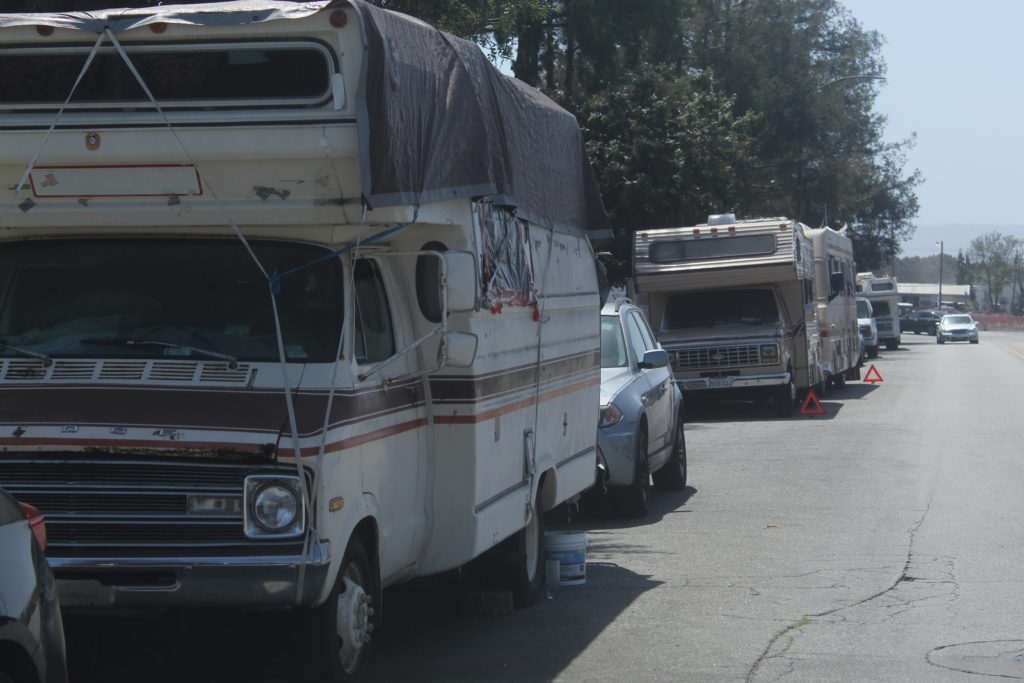As Debbie Guzman got out of the hospital, she received a call from her only neighbor—police officers were trying to get into Guzman’s RV.
By the time she got back to her vehicle on Will Wool Drive in San Jose, she said officers told her the vehicle would be impounded for unpaid registration, forcing Guzman to pay thousands of dollars to get it out of the tow yard. She said the towing companies loath coming into possession of RVs, and she managed to negotiate a lower fee.
She paid $6,000 to get her RV back.
“The tow guy was surprised I came back to pick it up. I guess not many people do,” she said.
San Jose residents and business owners say the number of RVs in San Jose has grown significantly as people lose their homes amid the pandemic. And towing companies are struggling due to increased labor costs coupled with unclaimed vehicles and scrap metal becoming less valuable. Tow operators reported in 2019 that more than half of impounded vehicles went unclaimed.
Adding to the financial hardship, COVID-19 forced tow yards to cancel public auction events. Even as San Jose lawmakers slashed the fees tow operators pay to do business with the city, the pandemic’s blow to the towing business bit into whatever money could have been saved by the city’s financial relief efforts.
In 2017, 3% of San Jose’s unhoused population lived in vehicles. That jumped to 17% in 2019. Data from the city homeless survey the same year suggests those living in emergency or transitional housing found themselves resorting back to living in vehicles—the most visible being recreational vehicles.
As the development of affordable housing races to keep up with the cost of living in San Jose, residents like Guzman say while they save money and wait for more affordable housing options, living in RVs is all they can afford.
RV residents secluded among encampments might not receive any more attention than their tent-dwelling neighbors—but the ones who anchor their four-wheeled homes near neighborhoods, businesses and other gathering places risk the wrath of the community.
The community’s irritation often manifests into calls for the city’s Department of Transportation to tow vehicles immediately. According to department spokesperson Colin Heyne, San Jose police and code enforcement officers can instigate a tow based on community complaints.
Once a call comes in, companies with an exclusive city contract to tow vehicles on public streets and rights-of-way respond to remove them from sight.
It’s become routine practice that six private towing companies participate in and financially benefit from—until recently.


Contracted towing companies impounded 4,000 vehicles between Aug. 1, 2017 and Feb. 28, 2018. Citywide vehicle impounds went up slightly in 2019 to 4,134, then dropped to 3,056 in 2020, in part because of the pandemic but also a lack of financial incentive to pick up so-called, “junk cars.”
None of the six city-contracted towing companies—Matos Auto Towing & Transport, City Towing, Century Tow, Motor Body Company, Courtesy Tow Services and Along Brothers—responded to requests for comment.
Morris & Sons Towing Company owner Art Amirkhas received a proposed contract from the city in 2016 to impound cars subject to complaints from residents.
“I immediately looked at it and threw it in the trash,” he said. “There was no way to make any money and it wasn’t sustainable economically, that contract—so I decided not to apply.”
The city reduced the fee all six companies pay to the city per-tow from $80 to $0 as of March 31.
Residents who encounter streets lined with RVs say they see the impact of reduced towing services every time they step outside—and the pandemic’s effect on the economy forces more people to find refuge in an area the size of a parking spot.
In the Mayfair neighborhood, pastor of Our Lady of Guadalupe parish Rev. Gerardo Menchaca drafted a letter to Alum Rock Union School District superintendent Hilaria Bauer stating his church faces challenges with encampments similar to theirs.


Guzman said she won’t move to a private RV park because the cost of rent is too expensive — most parks charge $30 a day and require months-long commitments.
Her living situation is uncomfortable, she said, and she plans to rent an apartment with her boyfriend. But the thousands of dollars she spent to get her RV released set back her plans. She yearns for stable housing to gain back custody of her son.
“I do the VSPDAT (housing eligibility assessment form) across different counties, and still nothing,” Guzman said. “But I’m not depending on a program to help me. I always manage to do it on my own. There’s people who don’t get towed and I don’t understand why, they’ve been threatened time and time again but they’re still there.”
Contact Vicente Vera at [email protected] or follow him @vicentejvera on Twitter.



Leave a Reply
You must be logged in to post a comment.